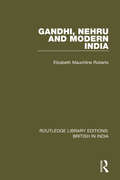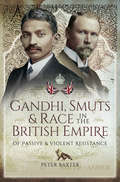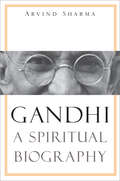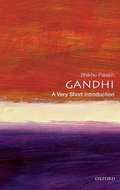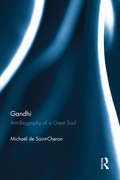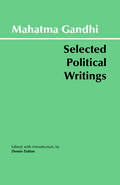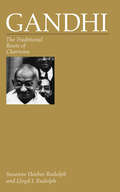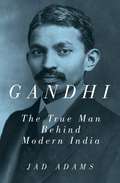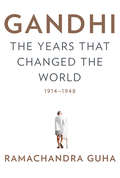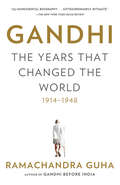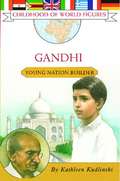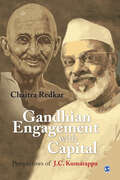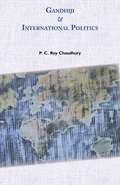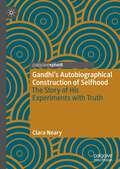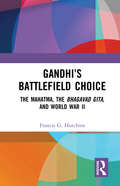- Table View
- List View
Gandhi, Nehru and Modern India (Routledge Library Editions: British In India Ser.)
by Elizabeth Mauchline RobertsIn tracing the development of India from British colony to self-governing independent republic, this book, first published in 1974, combines examples of what this has meant to individual Indians, whether Hindu, Muslim, Sikh or Christian, with an outline of India’s history from the end of the nineteenth century to the death of Nehru in 1964. It i
Gandhi, Smuts & Race in the British Empire: Of Passive & Violent Resistance
by Peter BaxterTowards the end of 1906, a meeting took place between two emerging giants of the age, Mohandas K. Gandhi and General Jan Christian Smuts. United under the same empire, but separated by distance and culture, Smuts was born in the Cape Colony, and Gandhi in Porbandar, a duchy of the Indian province of Gujarat. Both, however, went on to study law in Britain, and while developing a great admiration for the institutions of empire, each man also suffered his own particular crisis of faith. From their widely dispersed origins, Gandhi and Smuts collided over the issue of race and equality in a turbulent province of the empire, each attempting to hold the British to their stated ideals. This insightful book explores attitudes to race, and belonging, in an age when the English speaking peoples straddled the globe, and sought to impose on all of their subject races, basking under the radiance of Britannia, a common ideal of parity, equal opportunity and free movement.
Gandhi: 'Hind Swaraj' and Other Writings
by Anthony J. ParelHind Swaraj is Mahatma Gandhi's fundamental work. Not only is it key to understanding his life and thoughts, but also the politics of South Asia in the first half of the twentieth century. Celebrating 100 years since Hind Swaraj was first published in a newspaper, this centenary edition includes a new preface and editor's introduction, as well as a new chapter on 'Gandhi and the 'Canonical aims of life''. The volume presents a critical edition of the 1910 text of Hind Swaraj, fully annotated and including Gandhi's own Preface and Foreword (not found in other editions). Anthony J. Parel sets the work in its historical and political contexts and analyses the significance of Gandhi's experiences in England and South Africa. The second part of the volume contains some of Gandhi's other writings, including his correspondence with Tolstoy and Nehru.
Gandhi: A Beginner's Guide
by Genevieve BlaisThis title is an introduction to the life and works of Mahatma Gandhi. It investigates: his background and the times he lived in, Britain's role in the history of India, the events leading up to the Salt March, his assassination and his legacy.
Gandhi: A Beginner's Guide (BGKF)
by Genevieve BlaisThis title is an introduction to the life and works of Mahatma Gandhi. It investigates: his background and the times he lived in, Britain's role in the history of India, the events leading up to the Salt March, his assassination and his legacy.
Gandhi: A Spiritual Biography
by Arvind SharmaIn his Autobiography, Gandhi wrote, "What I want to achieve--what I have been striving and pining to achieve these thirty years--is self-realization, to see God face to face. . . . All that I do by way of speaking and writing, and all my ventures in the political field, are directed to this same end." While hundreds of biographies and histories have been written about Gandhi (1869-1948), nearly all of them have focused on the political, social, or familial dimensions of his life. Very few, in recounting how Gandhi led his country to political freedom, have viewed his struggle primarily as a search for spiritual liberation.Shifting the focus to the understudied subject of Gandhi's spiritual life, Arvind Sharma retells the story of Gandhi's life through this lens. Illuminating unsuspected dimensions of Gandhi's inner world and uncovering their surprising connections with his outward actions, Sharma explores the eclectic religious atmosphere in which Gandhi was raised, his belief in reincarnation, his conviction that morality and religion are synonymous, his attitudes toward tyranny and freedom, and, perhaps most important, the mysterious source of his power to establish new norms of human conduct. This book enlarges our understanding of one of history's most profoundly influential figures, a man whose trust in the power of the soul helped liberate millions.
Gandhi: A Very Short Introduction
by Bhikhu ParekhMohandas Karamchand Gandhi (1869-1948) was one of the few men in history to fight simultaneously on moral, religious, political, social, economic, and cultural fronts. During his time as a lawyer in South Africa he developed his strategy of non-violence: the idea of opposing unjust laws by non-violent protest. He led the Indian National Congress party in three major campaigns against British rule, each culminating in his arrest. In Gandhi, a short introduction to Gandhi's life and thought, Bhikhu Parekh outlines both Gandhi's major philosophical insights and the limitations of his thought. Written with extensive access to Gandhi's writings in Indian languages to which most commentators have little or no access, Parekh looks at Gandhi's cosmocentric anthropology, his spiritual view of politics, and his theories of oppression, non-violent action, and active citizenship. He also considers how the success of Gandhi's principles were limited by his lack of coherent theories of evil, and of state and power. Gandhi's view of man as ascetic allows no room for expressions of the cultural, artistic, or intellectual. Furthermore, he was so hostile to modern civilization that he was unable to appreciate its complex dialectic or offer a meaningful narrative. Nevertheless, Gandhi's life and thought had an enormous impact on the Indian nation, and he continues to be widely revered--known before and after his assassination as Mahatma, the Great Soul.
Gandhi: Anti-Biography of a Great Soul
by Michaël de Saint-CheronThis book is not just another biography of Gandhi. It is valuable because it offers us a French view--- and Jewish too perhaps---- of a man and times so familiar to us and yet which acquires another dimension as it is represented through another culture. There are eloquent accounts in this book of philosophers like Ramakrishna and Vivekananda who influenced Gandhi’s thought and life. Rather than political events, Michaël de Saint-Chéron holds up the force and courage of a man who became a prophet in a blood-thirsty century. Interestingly, the author points out that it is only India and the Middle East which has given the world the two mother religions of Hinduism and Judaism. Neither China nor Europe, two major cultures, have produced a world religion. The book is further enriched by a discussion on Hindu mysticism and the concept of ‘love’ in Judaism. The author also looks at how Gandhi has played a major role on shaping French intellectuals such as Andre Malraux. At the end however, a central dilemma, and a painful one to the work, concerns Gandhi’s silence on the Holocaust. This book will be of interest to scholars working on Gandhian studies, Indian philosophy and Judaism, and to readers of politics, ethics and history.
Gandhi: Selected Political Writings
by Mahatma Gandhi Dennis DaltonBased on the complete edition of his works, this new volume presents Gandhi's most important political writings arranged around the two central themes of his political teachings: satyagraha (the power of non-violence) and swaraj (freedom). Dennis Dalton's general Introduction and headnotes highlight the life of Gandhi, set the readings in historical context, and provide insight into the conceptual framework of Gandhi's political theory. Included are bibliography, glossary, and index.
Gandhi: Selected Political Writings
by Mahatma Gandhi Dennis DaltonBased on the complete edition of his works, this new volume presents Gandhi's most important political writings arranged around the two central themes of his political teachings: satyagraha (the power of non-violence) and swaraj (freedom). Dennis Dalton's general Introduction and headnotes highlight the life of Gandhi, set the readings in historical context, and provide insight into the conceptual framework of Gandhi's political theory. Included are bibliography, glossary, and index.
Gandhi: The Traditional Roots of Charisma
by Susanne Hoeber Rudolph Lloyd I. RudolphThe Rudolphs' analysis reveals that Gandhi's charisma was deeply rooted in the aspects of Indian tradition that he interpreted for his time. They key to his political influence was his ability to realize in both his daily life and his public actions, cultural ideals that many Indians honored but could not enact themselves—ideals such as the traditional Hindu belief that a person's capacity for self-control enhances his capacity to control his environment. Appealing to shared expectations and recognitions, Gandhi was able to revitalize tradition while simultaneously breaking with some of its entrenched values, practices, and interests. One result was a self-critical, ethical, and inclusive nationalist movement that eventually led to independence.
Gandhi: The True Man Behind Modern India
by Jad Adams"Provocative. Adams strips away Gandhi's saintly aura and explores the duality of India's most famous leader."--Financial Times Jad Adams traces the course of Gandhi's multi-faceted life and the development of his religious, political, and social thinking over seven tumultuous decades: from his comfortable upbringing in a princely state in Gujarat; his early civil rights campaigns; his leadership through civil disobedience in the 1920s and 1930s that made him a world icon; and finally to his assassination by a Hindu extremist in 1948, only months after the birth of an independent India. An elegant and masterly account of one of the seminal figures of twentieth-century history, Adams presents for the first time the true story behind the man whose life may truly be said to have changed the world.
Gandhi: The Years That Changed The World, 1914-1948
by Ramachandra GuhaAn epic and revelatory biography of one of the most abidingly influential--and controversial--men in modern history.Opening with Gandhi's triumphant return to India in 1915 after decades abroad, and ending with his tragic assassination in 1949, Gandhi: The Years that Changed the World is a remarkable, moving portrait that provides a crucial re-evaluation of India's iconic leader for a new generation. <p><p> Drawing on a wealth of newly uncovered materials unavailable to previous biographers, acclaimed historian and author Ramachandra Guha brings the past to life with extraordinary grace and clarity. Deploying his gifts as a storyteller and scholar, Guha presents Gandhi as both a fascinating human being--a man of fierce hope, eccentric personal beliefs, and sometimes dark and alarming contradictions--as well as a dynamic political force and global icon. <p> Sharp, insightful, balanced, and impeccably researched, this free-standing sequel to Guha's magisterial biography Gandhi Before India is an indispensable resource for a contemporary understanding of Gandhi's ever-evolving legacy.
Gandhi: The Years That Changed The World, 1914-1948
by Ramachandra GuhaThe second and concluding volume of the magisterial biography that began with the acclaimed, Gandhi Before India: the definitive portrait of the life and work of one of the most abidingly influential--and controversial--men in world history. <p><p> This volume opens with Mohandas Gandhi's arrival in Bombay in January 1915 and takes us through his epic struggles over the next three decades: to deliver India from British rule, to forge harmonious relations between India's Hindu and Muslim populations, to end the pernicious Hindu practice of untouchability, and to develop India's economic and moral self-reliance. We see how in each of these campaigns, Gandhi adapted methods of nonviolence--strikes, marches, fasts--that successfully challenged British authority, religious orthodoxy, social customs, and would influence non-violent, revolutionary movements throughout the world. <p> In reconstructing Gandhi's life and work, Ramachandra Guha has drawn on sixty different archival collections, the most significant among them, a previously unavailable collection of papers belonging to Gandhi himself. <p> Using this wealth of material, Guha creates a portrait of Gandhi and of those closest to him--family, friends, political and social leaders--that illuminates the complexity inside his thinking, his motives, his actions and their outcomes as he engaged with every important aspect of social and public life in the India of his time.
Gandhi: Young Nation Builder (Childhood of Famous Americans Series)
by Kathleen V. KudlinskiThis book narrates the fascinating early years and eventual accomplishments of the inspiring leader, Mahatma Gandhi, who is known as the Father of the Nation of India.
Gandhian Engagement with Capital: Perspectives of J C Kumarappa
by Chaitra RedkarGandhian Engagement with Capital: Perspectives of J C Kumarappa comprehensively presents the Gandhian ideas on economic development and political economy. Within this larger context, it focuses on the towering contributions of J C Kumarappa, the pioneer of the Gandhian model of economic development, and describes, from his standpoint, how the moral and political dispositions of Gandhism amount to a critique of capitalism. The book also covers in detail the major facets of Kumarappa’s contribution to Gandhism: developing a non-mechanized, non-capitalist model of industrialization; presenting the holistic development approach; reflecting on the role of the state in facilitating a village-centric economy; and exploring the role of religion in developing the moral foundation of the Gandhian political economy. These reflect the historical context of Kumarappa’s scholarship and his deep understanding of the various dimensions of Gandhian thought. The book highlights the debates within Gandhism and imparts a nuanced understanding of other Gandhian thinkers. Further, it presents several discourses in modern Indian political thought by analysing the interplay of narratives.
Gandhiji (Gujarati)
by Jugatram Daveગૂજરાત વિદ્યાપીઠ તરફથી દર વરસે ગાંધીજયંતીને દિવસે ‘ગાંધીજીવન-ઝાંખી‘ની પરીક્ષા લેવાય છે. પાંચથી સાત ધોરણના વિદ્યાર્થીઓ માટેની આ પરીક્ષામાં કુદસિયા જૈદીનું ‘ગાંધીબાપુ‘ પુસ્તક શરૂથી પાઠ્યપુસ્તક તરીકે ચાલે છે. ચાલુ વરસથી આ પુસ્તક ઉપરાંત ગાંધીજીના જીવનના પ્રસંગો આલેખતું સ્વ. શ્રી જુગતરામ દવેનું ‘ગાંધીજી‘ પુસ્તક પણ પાઠ્યપુસ્તક તરીકે ઉમેરવાનું નક્કી થયું છે. એ પુસ્તકની પહેલી આવૃત્તિ 1929માં પ્રસિદ્ધ થયેલી. આજ સુધીમાં તેની લગભગ લાખ જેટલી નકલો વેચાઈ છે. આ પુસ્તક એ જ પુસ્તકની પરીક્ષા માટેની રાહત દરની ખાસ આવૃત્તિ છે. પરીક્ષામાં બેસનાર વિદ્યાર્થીઓ ગાંધીજીના જીવન અને કાર્યને વ્યક્ત કરતાં કાવ્યોનો મુખપાઠ કરે તે જરૂરી લાગતાં આ આવૃત્તિમાં તેવાં પાંચ કાવ્યો પુસ્તકને અંતે આપ્યાં છે.
Gandhiji (Hindi)
by Jugatram Daveपिछले बारह बरससे गुजरातके बालक इस पुस्तकको बड़े चावके साथ पढ़ते आ रहे हैं| बारह बरस पहले श्री जुगतरामभाईने इसे गुजरातके हमारे बालमित्रोंके लिए लिखा था| उन्हीं दिनोंमें मैंने इसका एक अनुवाद किया था, जो बादमें कहीं लापता हो गया| बारह साल बाद अबको मुझे मौका मिला और मैंने इसका दुबारा अनुवाद किया| पुस्तक आपके हाथमें है| आप इसे पढ़िये| उत्साह और उमंगके साथ पढ़िये| बार-बार पढ़िये और पढ़कर गांधीजीके जीवनको समझनेकी कोशिश कीजिये| ईश्वर करे, पूज्य गांधीजीके जीवनकी ये झाँकियाँ हममें से हरएकको ऊँचा उठाने और आगे बढ़नेवाली हों!
Gandhiji and International Politics
by P. C. Roy ChaudhuryGandhiji never lived and died for the freedom of India alone. He had observed: “Through realization of freedom of India I hope to realize and carry on the mission of the brotherhood of man.” With him not to believe in the possibility of international peace was to disbelieve in the godliness of human nature. Truly Gandhiji was the universal man—the man who stands out as the landmark and his value as the universal man will go on increasing through the passage of time. Gandhiji is dead but Gandhism shall survive the lashes of time and changes in the material world.
Gandhijinu Jivan — Emnaj Shabdoma
by Krishna Kruplaniહું મારા ઘરની આસપાસ દીવાલ ચણી લેવા તથા મારી બારીઓ બંધ કરી દેવા નથી માગતો. મારા ઘરની આસપાસ સઘળા દેશોની સંસ્કૃતિના પવનની લહેરીઓ છૂટથી વાતી રહે એમ હું ઇચ્છું છું. પણ પવનની એવી કોઈ લહરી દ્વારા જમીનથી અધ્ધર થઈ જવાનો હું ઇનકાર કરું છું. સાહિત્યમાં રસ ધરાવતાં આપણાં તરુણ સ્ત્રીપુરુષો અંગ્રેજી ભાષા તેમ જ બીજી વિશ્વભાષાઓ પેટ ભરીને શીખે એમ હું ઇચ્છું છું. અને પછી તેઓ જગદીશચંદ્ર બોઝ, પ્રફુલ્લચંદ્ર રોય અને કવિવર રવીન્દ્રનાથ ટાગોરની પેઠે પોતાના અભ્યાસનો લાભ હિંદને તથા દુનિયાને આપે એવી તેમની પાસેથી અપેક્ષા રાખું. પરંતુ એક પણ હિંદવાસી પોતાની માતૃભાષાને ભૂલે, તેની અવગણના કરે કે તેનાથી શરમાય અથવા પોતાની માતૃભાષામાં પોતે વિચાર કરી શકતો નથી કે પોતાના વિચારો સારામાં સારી રીતે દર્શાવી શકતો નથી એમ તેને લાગે, એમ હું ઇચ્છતો નથી. મારો ધર્મ ચોકાપંથી નથી. — ગાંધીજી
Gandhijinu Khovayelu Dhan: Harilal Gandhi
by Nilam Parikhજેમના વિશે કલાકૃતિઓ તૈયાર થઈ હોય એવી વ્યકિતઓ પ્રત્યે ઊંચા આદર અને સન્માન ધરાવનારી બધી વ્યક્તિઓ અને સંસ્થાઓનો એ ધર્મ બની રહે છે કે તેઓ આદરણીય વ્યક્તિઓ અંગેની જે કાંઈ નાનીમોટી બધી જ હકીકતો કે અન્ય સાહિત્ય ઉપલબ્ધ હોય અને હજી સુધી પ્રકાશમાં ન આવ્યાં હોય તેને લોકો સમક્ષ રજૂ કરે જેથી તે આદરણીય વ્યક્તિઓનાં થતાં ભૂલભરેલાં ચિત્રણ અને તેને કારણે થતા અન્યાય સામે ઢાલ બની રહે. આ ભાવનાથી દોરાઈને આ વિચારને અમલમાં મૂકવા આ પુસ્તક પ્રગટ કરવાનું નક્કી કર્યું.
Gandhijinu Shikshan Darshan
by Mahatma Gandhiશિક્ષણ દ્વારા પ્રજાનું ચારિત્ર્યઘડતર કર્યા સિવાયની દેશની બધી પ્રગતિ એકડા વગરના મીડા બરાબર સાબિત થવાની છે એની ખાતરી એમને થઈ ચૂકી હતી. તેથી જ આઝાદીના આગમના પૂર્વે કોઈએ એમને પૂછેલું કે સ્વતંત્રતા બાદ શિક્ષણનો તમારો આદર્શ શો હશે? ત્યારે એકક્ષણનાય વિલંબ વિના એમણે કહેલું: ચારિત્રઘડતર. આઝાદી પછી આપણે ત્યાં રાષ્ટ્રીય વિકાસની અનેક યોજનાઓ ઘડાઈ અને અમલમાં મુકાઈ. એ દ્વારા દેશે ઘણો ભૌતિક વિકાસ સાધ્યો છે એ હકીકત છે. પરંતુ લોકોના સર્વાંગીણ ચારિત્ર્યઘડતર માટે જે થવું ઘટે.
Gandhijiyin Irudhi 200 Naatkal: காந்திஜியின் இறுதி 200 நாட்கள்
by V. Ramamurthyஇந்நூலில் காந்திஜியின் கடைசி 200 நாட்கள் ஆவணப்படுத்தப்பட்டிருக்கின்றன. மேலும் அவர் தன்னுடைய கடைசி 200 நாட்களில் மக்களுக்காக எவ்வளவு பாடுபட்டார் என்பதை பற்றி வி. ராமமூர்த்தி மிகவும் அவர்கள் மிகுந்த பொறுப்புணர்வுடன் கூறியுள்ளார்.
Gandhi’s Autobiographical Construction of Selfhood: The Story of His Experiments with Truth
by Clara NearyThis book addresses the topics of autobiography, self-representation and status as a writer in Mahatma Gandhi's autobiographical work The Story of My Experiments with Truth (1927, 1929). Gandhi remains an elusive figure, despite the volumes of literature written on him in the seven decades since his assassination. Scholars and biographers alike agree that “no work on his life has portrayed him in totality” (Desai, 2009), and, although “arguably the most popular figure of the first half of the twentieth century” and “one of the most eminent luminaries of our time,” Gandhi the individual remains “as much an enigma as a person of endless fascination” (Murrell, 2008). Yet there has been relatively little scholarly engagement with Gandhi’s autobiography, and published output has largely been concerned with mining the text for its biographical details, with little concern for how Gandhi represents himself. The author addresses this gap in the literature, while also considering Gandhi as a writer. This book provides a close reading of the linguistic structure of the text with particular focus upon Gandhi’s self-representation, drawing on a cognitive stylistic framework for analysing linguistic representations of selfhood (Emmott 2002). It will be of interest to stylisticians, cognitive linguists, discourse analysts, and scholars in related fields such as Indian literature and postcolonial studies.
Gandhi’s Battlefield Choice: The Mahatma, The Bhagavad Gita, and World War II
by Francis G. HutchinsThis much anticipated volume compares and contrasts Gandhi’s non-violent leadership during World War II to the military leadership of Arjuna in the war that prompted the Bhagavad Gita dialogue, the Sanskrit text that guided Gandhi’s actions throughout his life. Early in his career as leader of India’s campaign to end British rule, Gandhi resisted terrorist interpretations of the Gita and described the Gita as depicting a metaphorical battle between good and evil impulses within every human heart. Then when India was drawn into a world war not unlike that in which Arjuna reluctantly led his troops into combat, Gandhi embraced his role as battlefield commander of the millions he had trained to be non-violent warriors. Never abandoning his dedication to non-violence, Gandhi stressed to his recruits that they should act as non-violently as possible but should not passively accept injustice. Remaining true to the Bhagavad Gita while responding to urgent hazards affecting all Indians, Gandhi himself became a wartime battlefield commander leading millions in the climactic Quit India conflict that ended British rule. <P><P>The volume provides an overview of Gandhi’s entire career as leader of the Indian Nationalist Movement, clarifies Gandhi’s approach to acting non-violently when surrounded by violence, and affirms Gandhi’s enduring importance as a source of inspiration around the world. P><P>Please note: Taylor & Francis does not sell or distribute the Hardback in India, Pakistan, Nepal, Bhutan, Bangladesh and Sri Lanka
